Budgeting's Role in Management Accounting for Organizational Success
VerifiedAdded on 2023/01/07
|8
|1916
|39
Report
AI Summary
This report delves into the critical role of budgeting within organizations, a core function of management accounting. It begins by defining management accounting and highlighting the importance of budgeting for effective decision-making and planning. The report then explores various budgeting types, including sales, cash, production, and master budgets, explaining their functions and significance. Furthermore, it examines the role of budgeting in key areas such as planning, organizing, decision-making, and controlling. The report also differentiates between static and flexible budgeting styles, outlining their advantages and disadvantages. Finally, it discusses participative budgeting, its merits, and demerits, including considerations like time consumption, labor costs, and the potential for budgetary slack. The conclusion summarizes the key takeaways, emphasizing the importance of budgeting for financial forecasting and informed decision-making.
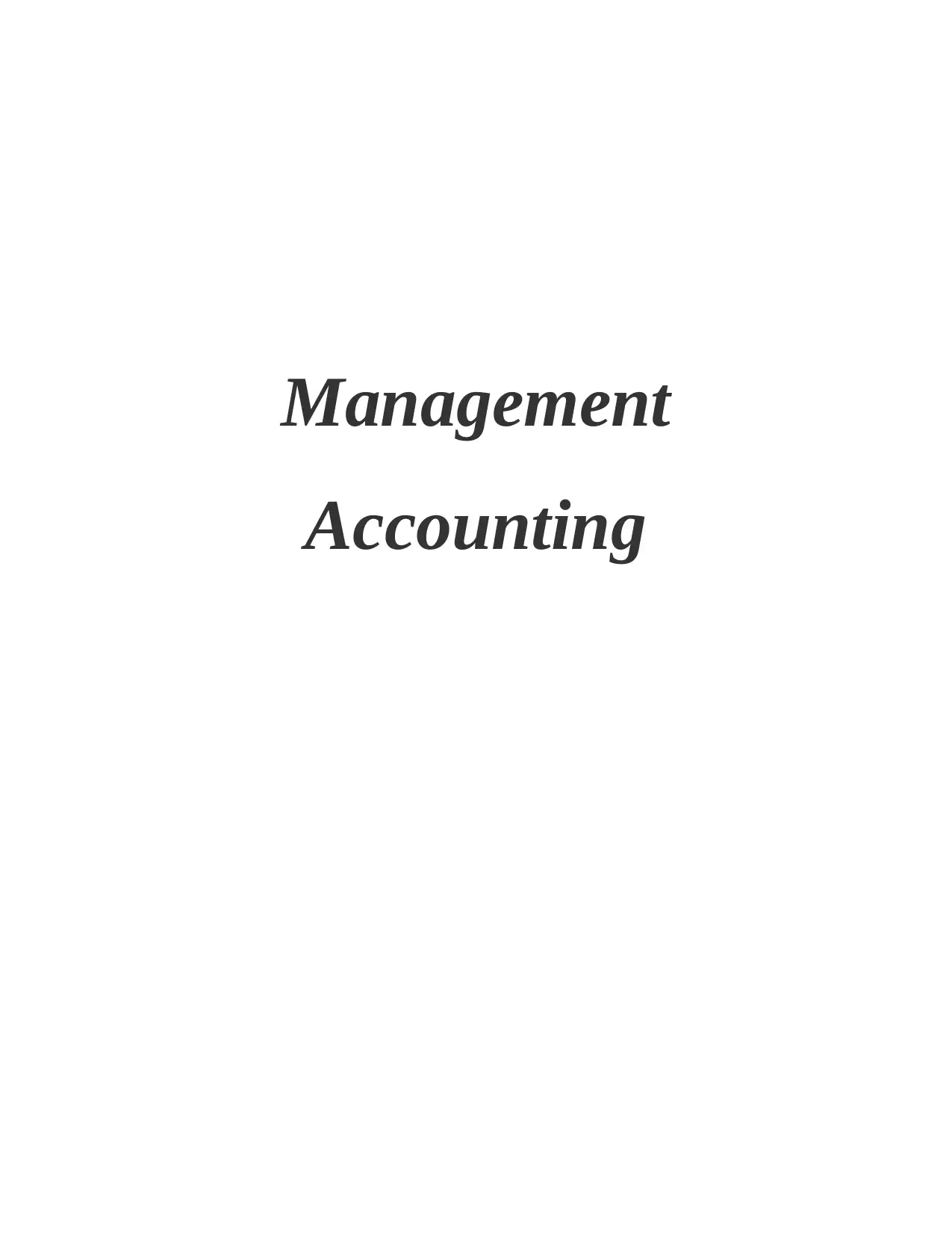
Management
Accounting
Accounting
Paraphrase This Document
Need a fresh take? Get an instant paraphrase of this document with our AI Paraphraser
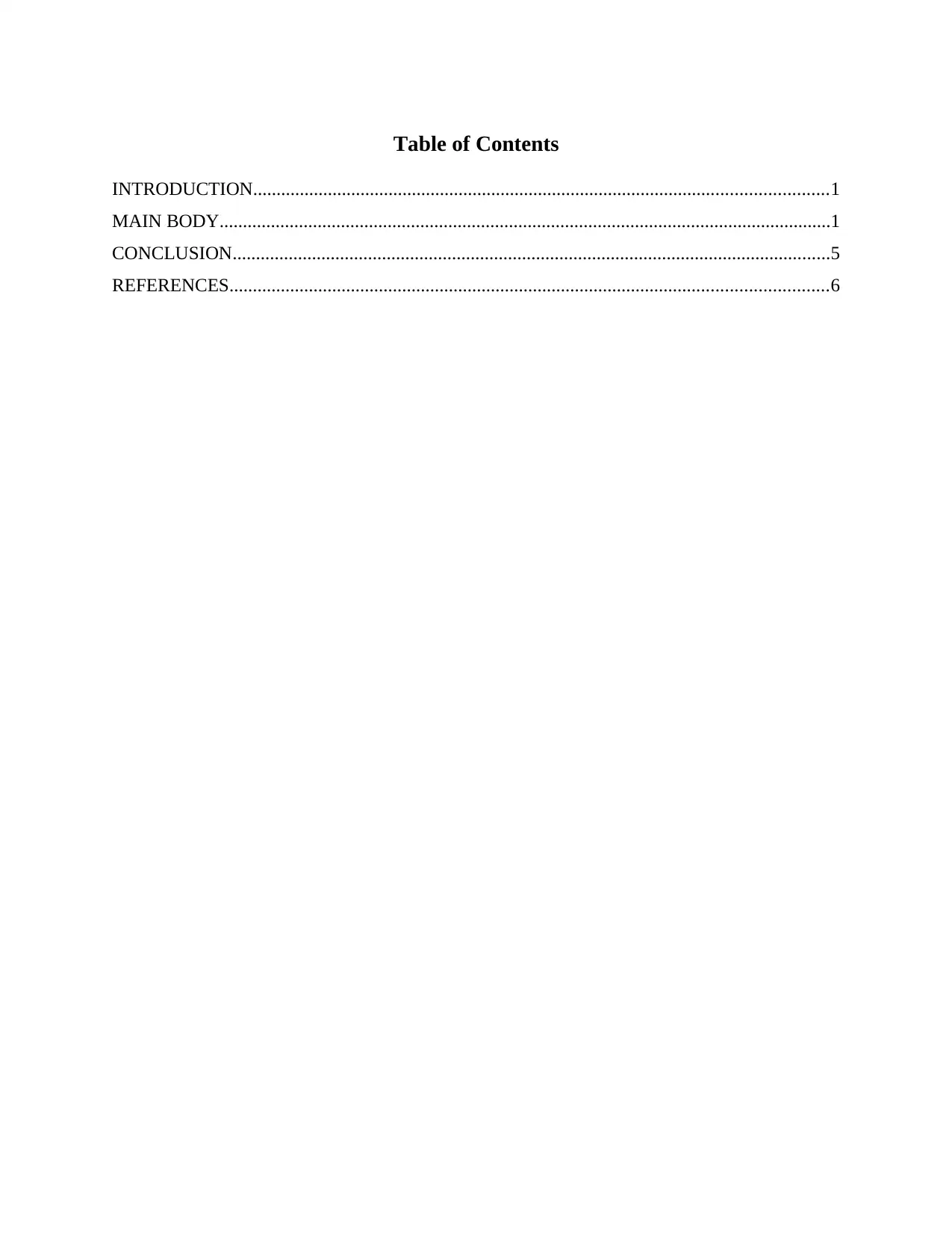
Table of Contents
INTRODUCTION...........................................................................................................................1
MAIN BODY...................................................................................................................................1
CONCLUSION................................................................................................................................5
REFERENCES................................................................................................................................6
INTRODUCTION...........................................................................................................................1
MAIN BODY...................................................................................................................................1
CONCLUSION................................................................................................................................5
REFERENCES................................................................................................................................6
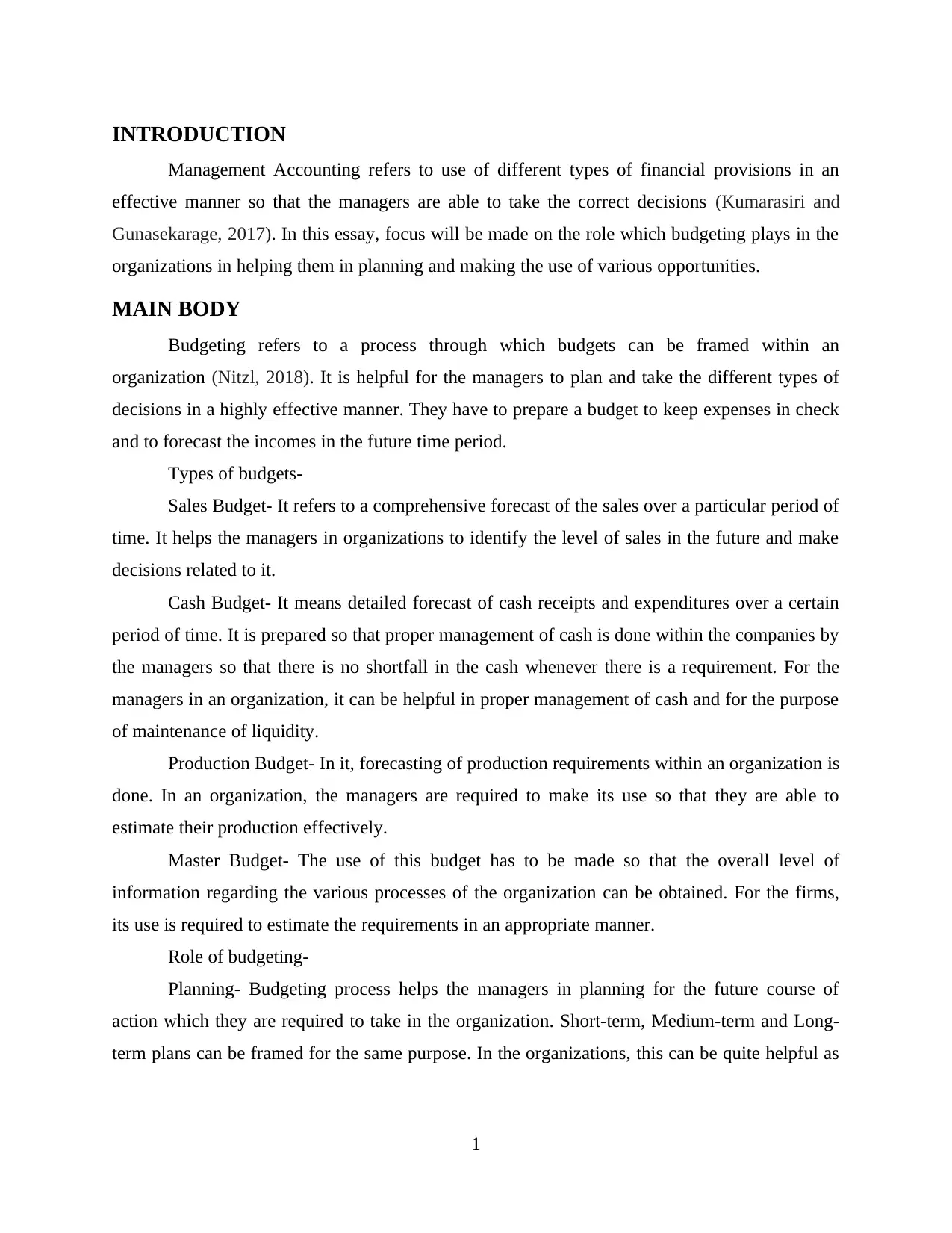
INTRODUCTION
Management Accounting refers to use of different types of financial provisions in an
effective manner so that the managers are able to take the correct decisions (Kumarasiri and
Gunasekarage, 2017). In this essay, focus will be made on the role which budgeting plays in the
organizations in helping them in planning and making the use of various opportunities.
MAIN BODY
Budgeting refers to a process through which budgets can be framed within an
organization (Nitzl, 2018). It is helpful for the managers to plan and take the different types of
decisions in a highly effective manner. They have to prepare a budget to keep expenses in check
and to forecast the incomes in the future time period.
Types of budgets-
Sales Budget- It refers to a comprehensive forecast of the sales over a particular period of
time. It helps the managers in organizations to identify the level of sales in the future and make
decisions related to it.
Cash Budget- It means detailed forecast of cash receipts and expenditures over a certain
period of time. It is prepared so that proper management of cash is done within the companies by
the managers so that there is no shortfall in the cash whenever there is a requirement. For the
managers in an organization, it can be helpful in proper management of cash and for the purpose
of maintenance of liquidity.
Production Budget- In it, forecasting of production requirements within an organization is
done. In an organization, the managers are required to make its use so that they are able to
estimate their production effectively.
Master Budget- The use of this budget has to be made so that the overall level of
information regarding the various processes of the organization can be obtained. For the firms,
its use is required to estimate the requirements in an appropriate manner.
Role of budgeting-
Planning- Budgeting process helps the managers in planning for the future course of
action which they are required to take in the organization. Short-term, Medium-term and Long-
term plans can be framed for the same purpose. In the organizations, this can be quite helpful as
1
Management Accounting refers to use of different types of financial provisions in an
effective manner so that the managers are able to take the correct decisions (Kumarasiri and
Gunasekarage, 2017). In this essay, focus will be made on the role which budgeting plays in the
organizations in helping them in planning and making the use of various opportunities.
MAIN BODY
Budgeting refers to a process through which budgets can be framed within an
organization (Nitzl, 2018). It is helpful for the managers to plan and take the different types of
decisions in a highly effective manner. They have to prepare a budget to keep expenses in check
and to forecast the incomes in the future time period.
Types of budgets-
Sales Budget- It refers to a comprehensive forecast of the sales over a particular period of
time. It helps the managers in organizations to identify the level of sales in the future and make
decisions related to it.
Cash Budget- It means detailed forecast of cash receipts and expenditures over a certain
period of time. It is prepared so that proper management of cash is done within the companies by
the managers so that there is no shortfall in the cash whenever there is a requirement. For the
managers in an organization, it can be helpful in proper management of cash and for the purpose
of maintenance of liquidity.
Production Budget- In it, forecasting of production requirements within an organization is
done. In an organization, the managers are required to make its use so that they are able to
estimate their production effectively.
Master Budget- The use of this budget has to be made so that the overall level of
information regarding the various processes of the organization can be obtained. For the firms,
its use is required to estimate the requirements in an appropriate manner.
Role of budgeting-
Planning- Budgeting process helps the managers in planning for the future course of
action which they are required to take in the organization. Short-term, Medium-term and Long-
term plans can be framed for the same purpose. In the organizations, this can be quite helpful as
1
⊘ This is a preview!⊘
Do you want full access?
Subscribe today to unlock all pages.

Trusted by 1+ million students worldwide
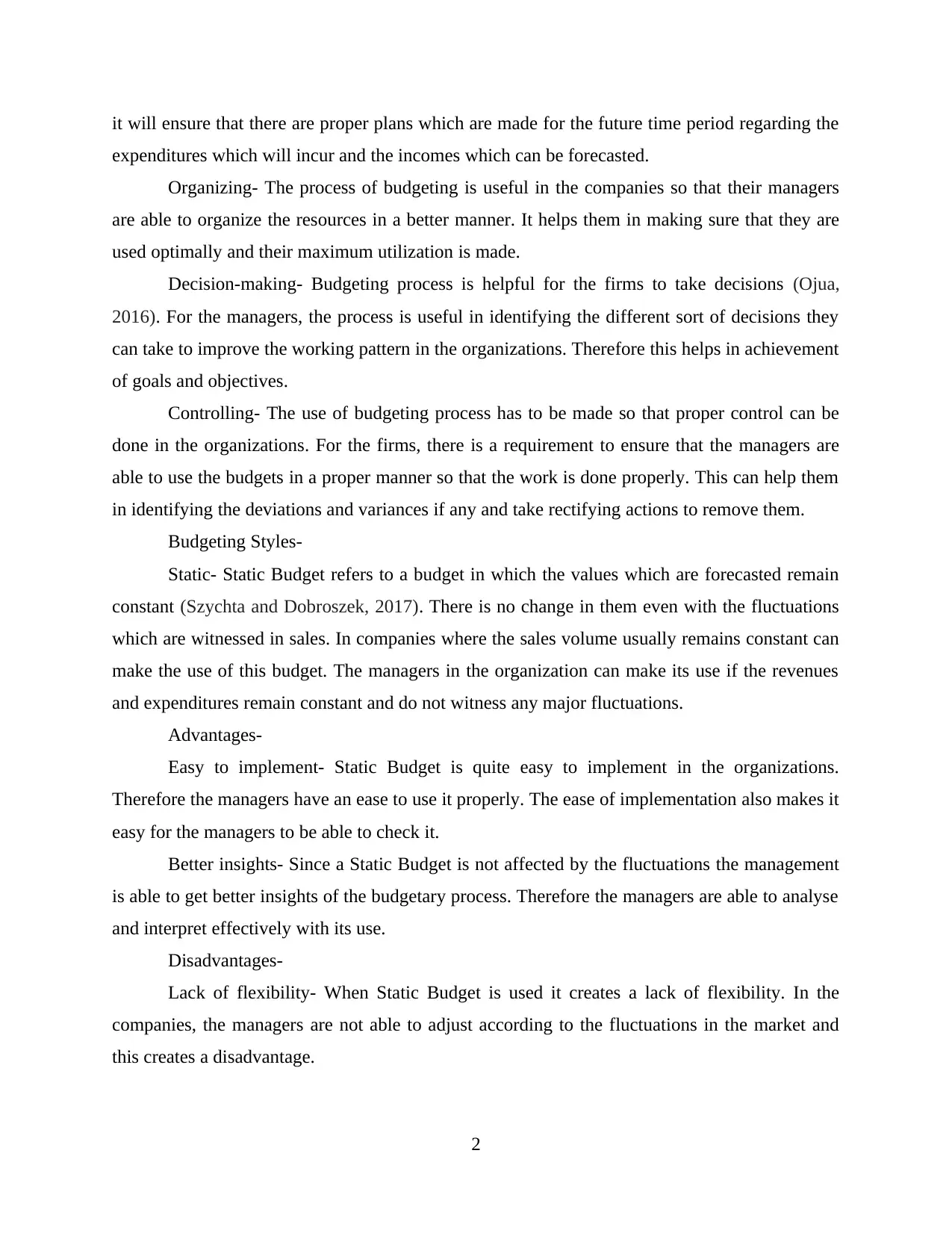
it will ensure that there are proper plans which are made for the future time period regarding the
expenditures which will incur and the incomes which can be forecasted.
Organizing- The process of budgeting is useful in the companies so that their managers
are able to organize the resources in a better manner. It helps them in making sure that they are
used optimally and their maximum utilization is made.
Decision-making- Budgeting process is helpful for the firms to take decisions (Ojua,
2016). For the managers, the process is useful in identifying the different sort of decisions they
can take to improve the working pattern in the organizations. Therefore this helps in achievement
of goals and objectives.
Controlling- The use of budgeting process has to be made so that proper control can be
done in the organizations. For the firms, there is a requirement to ensure that the managers are
able to use the budgets in a proper manner so that the work is done properly. This can help them
in identifying the deviations and variances if any and take rectifying actions to remove them.
Budgeting Styles-
Static- Static Budget refers to a budget in which the values which are forecasted remain
constant (Szychta and Dobroszek, 2017). There is no change in them even with the fluctuations
which are witnessed in sales. In companies where the sales volume usually remains constant can
make the use of this budget. The managers in the organization can make its use if the revenues
and expenditures remain constant and do not witness any major fluctuations.
Advantages-
Easy to implement- Static Budget is quite easy to implement in the organizations.
Therefore the managers have an ease to use it properly. The ease of implementation also makes it
easy for the managers to be able to check it.
Better insights- Since a Static Budget is not affected by the fluctuations the management
is able to get better insights of the budgetary process. Therefore the managers are able to analyse
and interpret effectively with its use.
Disadvantages-
Lack of flexibility- When Static Budget is used it creates a lack of flexibility. In the
companies, the managers are not able to adjust according to the fluctuations in the market and
this creates a disadvantage.
2
expenditures which will incur and the incomes which can be forecasted.
Organizing- The process of budgeting is useful in the companies so that their managers
are able to organize the resources in a better manner. It helps them in making sure that they are
used optimally and their maximum utilization is made.
Decision-making- Budgeting process is helpful for the firms to take decisions (Ojua,
2016). For the managers, the process is useful in identifying the different sort of decisions they
can take to improve the working pattern in the organizations. Therefore this helps in achievement
of goals and objectives.
Controlling- The use of budgeting process has to be made so that proper control can be
done in the organizations. For the firms, there is a requirement to ensure that the managers are
able to use the budgets in a proper manner so that the work is done properly. This can help them
in identifying the deviations and variances if any and take rectifying actions to remove them.
Budgeting Styles-
Static- Static Budget refers to a budget in which the values which are forecasted remain
constant (Szychta and Dobroszek, 2017). There is no change in them even with the fluctuations
which are witnessed in sales. In companies where the sales volume usually remains constant can
make the use of this budget. The managers in the organization can make its use if the revenues
and expenditures remain constant and do not witness any major fluctuations.
Advantages-
Easy to implement- Static Budget is quite easy to implement in the organizations.
Therefore the managers have an ease to use it properly. The ease of implementation also makes it
easy for the managers to be able to check it.
Better insights- Since a Static Budget is not affected by the fluctuations the management
is able to get better insights of the budgetary process. Therefore the managers are able to analyse
and interpret effectively with its use.
Disadvantages-
Lack of flexibility- When Static Budget is used it creates a lack of flexibility. In the
companies, the managers are not able to adjust according to the fluctuations in the market and
this creates a disadvantage.
2
Paraphrase This Document
Need a fresh take? Get an instant paraphrase of this document with our AI Paraphraser
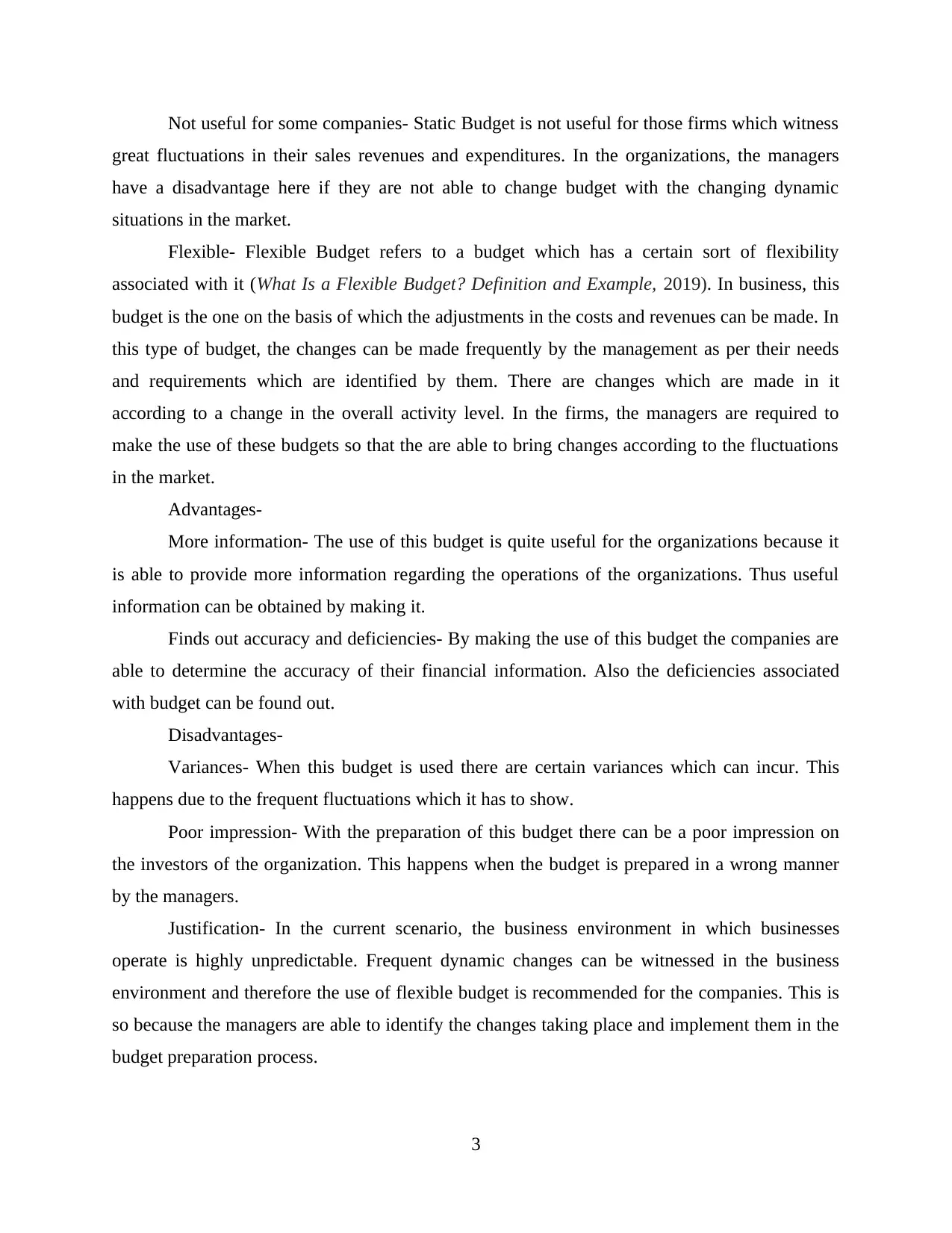
Not useful for some companies- Static Budget is not useful for those firms which witness
great fluctuations in their sales revenues and expenditures. In the organizations, the managers
have a disadvantage here if they are not able to change budget with the changing dynamic
situations in the market.
Flexible- Flexible Budget refers to a budget which has a certain sort of flexibility
associated with it (What Is a Flexible Budget? Definition and Example, 2019). In business, this
budget is the one on the basis of which the adjustments in the costs and revenues can be made. In
this type of budget, the changes can be made frequently by the management as per their needs
and requirements which are identified by them. There are changes which are made in it
according to a change in the overall activity level. In the firms, the managers are required to
make the use of these budgets so that the are able to bring changes according to the fluctuations
in the market.
Advantages-
More information- The use of this budget is quite useful for the organizations because it
is able to provide more information regarding the operations of the organizations. Thus useful
information can be obtained by making it.
Finds out accuracy and deficiencies- By making the use of this budget the companies are
able to determine the accuracy of their financial information. Also the deficiencies associated
with budget can be found out.
Disadvantages-
Variances- When this budget is used there are certain variances which can incur. This
happens due to the frequent fluctuations which it has to show.
Poor impression- With the preparation of this budget there can be a poor impression on
the investors of the organization. This happens when the budget is prepared in a wrong manner
by the managers.
Justification- In the current scenario, the business environment in which businesses
operate is highly unpredictable. Frequent dynamic changes can be witnessed in the business
environment and therefore the use of flexible budget is recommended for the companies. This is
so because the managers are able to identify the changes taking place and implement them in the
budget preparation process.
3
great fluctuations in their sales revenues and expenditures. In the organizations, the managers
have a disadvantage here if they are not able to change budget with the changing dynamic
situations in the market.
Flexible- Flexible Budget refers to a budget which has a certain sort of flexibility
associated with it (What Is a Flexible Budget? Definition and Example, 2019). In business, this
budget is the one on the basis of which the adjustments in the costs and revenues can be made. In
this type of budget, the changes can be made frequently by the management as per their needs
and requirements which are identified by them. There are changes which are made in it
according to a change in the overall activity level. In the firms, the managers are required to
make the use of these budgets so that the are able to bring changes according to the fluctuations
in the market.
Advantages-
More information- The use of this budget is quite useful for the organizations because it
is able to provide more information regarding the operations of the organizations. Thus useful
information can be obtained by making it.
Finds out accuracy and deficiencies- By making the use of this budget the companies are
able to determine the accuracy of their financial information. Also the deficiencies associated
with budget can be found out.
Disadvantages-
Variances- When this budget is used there are certain variances which can incur. This
happens due to the frequent fluctuations which it has to show.
Poor impression- With the preparation of this budget there can be a poor impression on
the investors of the organization. This happens when the budget is prepared in a wrong manner
by the managers.
Justification- In the current scenario, the business environment in which businesses
operate is highly unpredictable. Frequent dynamic changes can be witnessed in the business
environment and therefore the use of flexible budget is recommended for the companies. This is
so because the managers are able to identify the changes taking place and implement them in the
budget preparation process.
3
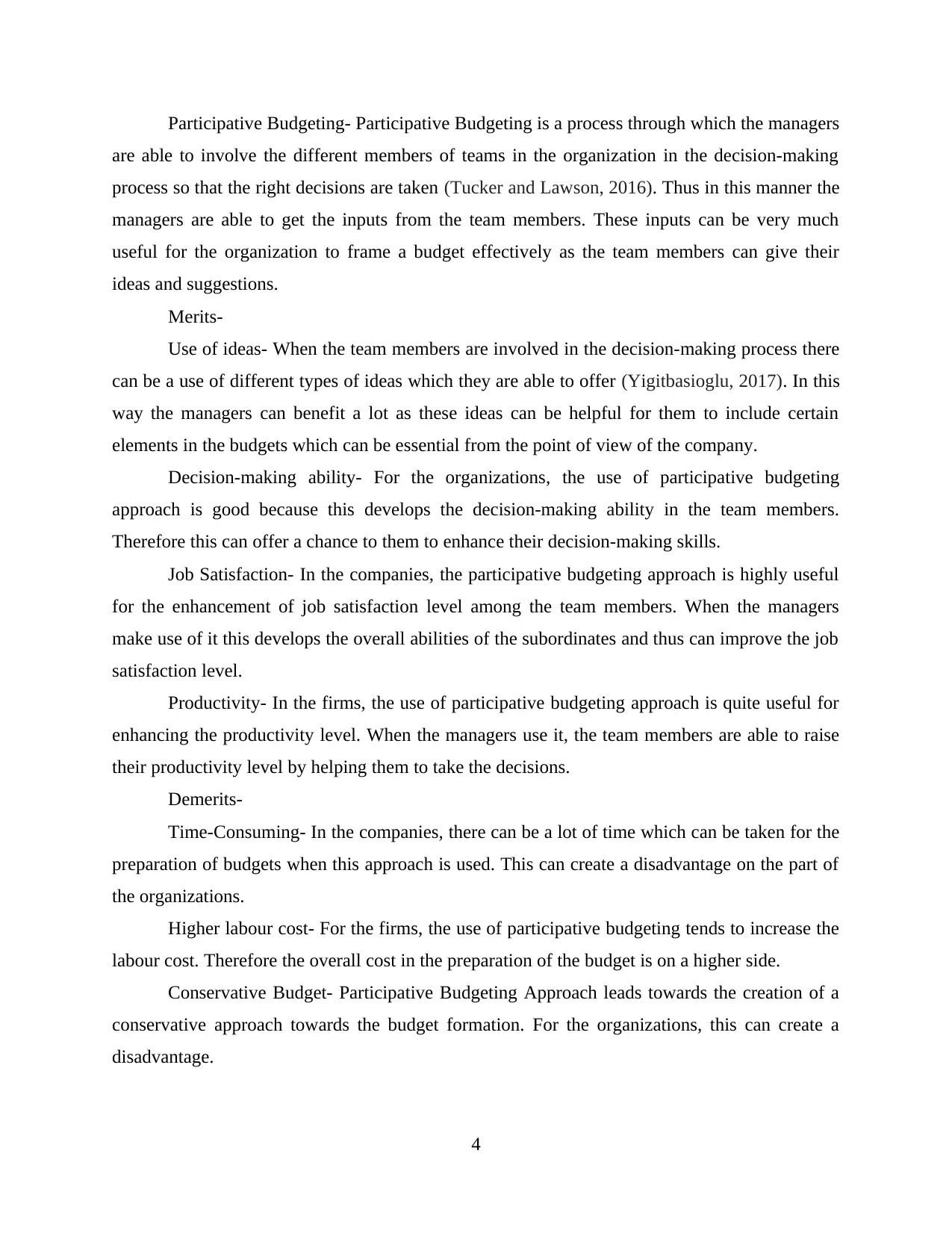
Participative Budgeting- Participative Budgeting is a process through which the managers
are able to involve the different members of teams in the organization in the decision-making
process so that the right decisions are taken (Tucker and Lawson, 2016). Thus in this manner the
managers are able to get the inputs from the team members. These inputs can be very much
useful for the organization to frame a budget effectively as the team members can give their
ideas and suggestions.
Merits-
Use of ideas- When the team members are involved in the decision-making process there
can be a use of different types of ideas which they are able to offer (Yigitbasioglu, 2017). In this
way the managers can benefit a lot as these ideas can be helpful for them to include certain
elements in the budgets which can be essential from the point of view of the company.
Decision-making ability- For the organizations, the use of participative budgeting
approach is good because this develops the decision-making ability in the team members.
Therefore this can offer a chance to them to enhance their decision-making skills.
Job Satisfaction- In the companies, the participative budgeting approach is highly useful
for the enhancement of job satisfaction level among the team members. When the managers
make use of it this develops the overall abilities of the subordinates and thus can improve the job
satisfaction level.
Productivity- In the firms, the use of participative budgeting approach is quite useful for
enhancing the productivity level. When the managers use it, the team members are able to raise
their productivity level by helping them to take the decisions.
Demerits-
Time-Consuming- In the companies, there can be a lot of time which can be taken for the
preparation of budgets when this approach is used. This can create a disadvantage on the part of
the organizations.
Higher labour cost- For the firms, the use of participative budgeting tends to increase the
labour cost. Therefore the overall cost in the preparation of the budget is on a higher side.
Conservative Budget- Participative Budgeting Approach leads towards the creation of a
conservative approach towards the budget formation. For the organizations, this can create a
disadvantage.
4
are able to involve the different members of teams in the organization in the decision-making
process so that the right decisions are taken (Tucker and Lawson, 2016). Thus in this manner the
managers are able to get the inputs from the team members. These inputs can be very much
useful for the organization to frame a budget effectively as the team members can give their
ideas and suggestions.
Merits-
Use of ideas- When the team members are involved in the decision-making process there
can be a use of different types of ideas which they are able to offer (Yigitbasioglu, 2017). In this
way the managers can benefit a lot as these ideas can be helpful for them to include certain
elements in the budgets which can be essential from the point of view of the company.
Decision-making ability- For the organizations, the use of participative budgeting
approach is good because this develops the decision-making ability in the team members.
Therefore this can offer a chance to them to enhance their decision-making skills.
Job Satisfaction- In the companies, the participative budgeting approach is highly useful
for the enhancement of job satisfaction level among the team members. When the managers
make use of it this develops the overall abilities of the subordinates and thus can improve the job
satisfaction level.
Productivity- In the firms, the use of participative budgeting approach is quite useful for
enhancing the productivity level. When the managers use it, the team members are able to raise
their productivity level by helping them to take the decisions.
Demerits-
Time-Consuming- In the companies, there can be a lot of time which can be taken for the
preparation of budgets when this approach is used. This can create a disadvantage on the part of
the organizations.
Higher labour cost- For the firms, the use of participative budgeting tends to increase the
labour cost. Therefore the overall cost in the preparation of the budget is on a higher side.
Conservative Budget- Participative Budgeting Approach leads towards the creation of a
conservative approach towards the budget formation. For the organizations, this can create a
disadvantage.
4
⊘ This is a preview!⊘
Do you want full access?
Subscribe today to unlock all pages.

Trusted by 1+ million students worldwide
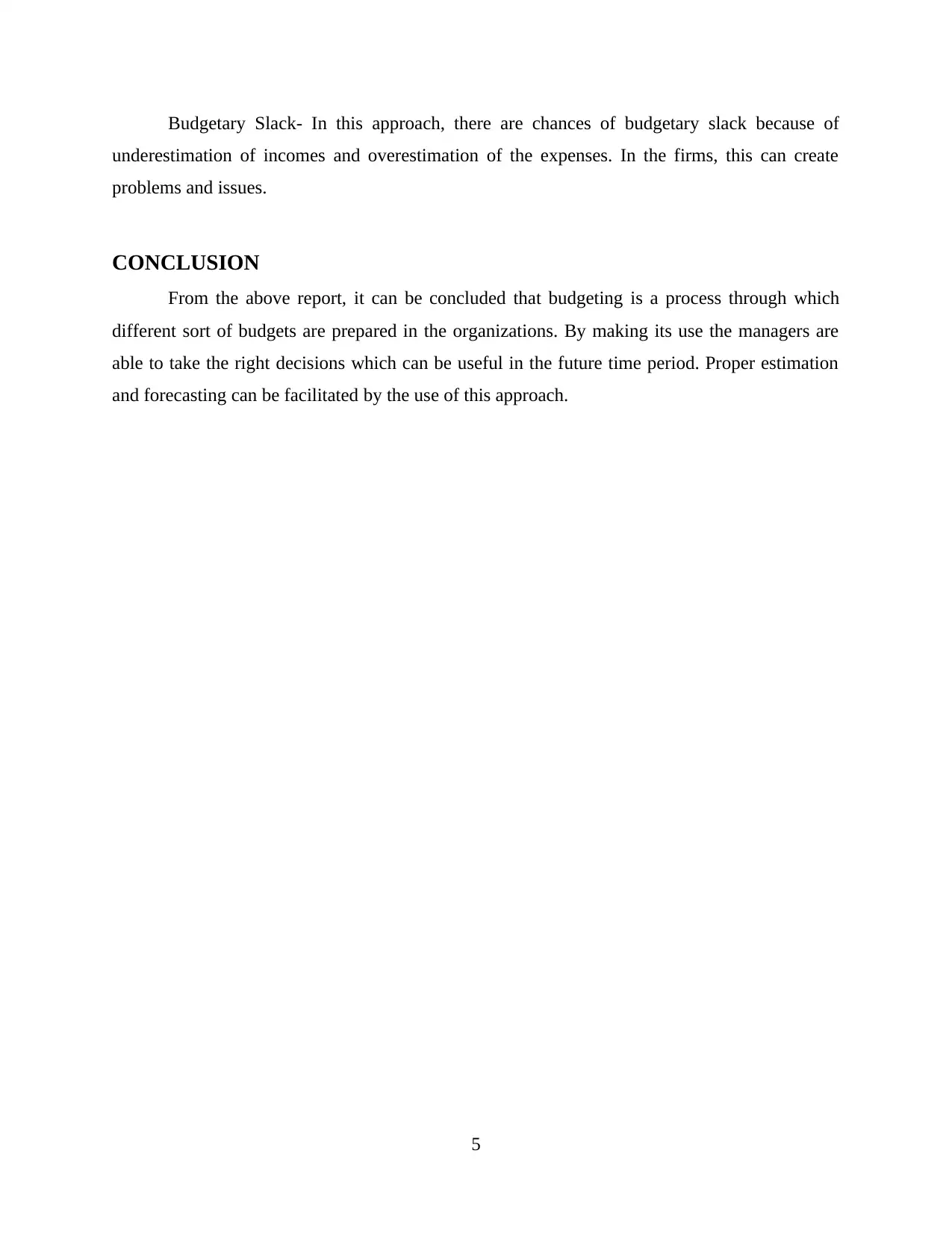
Budgetary Slack- In this approach, there are chances of budgetary slack because of
underestimation of incomes and overestimation of the expenses. In the firms, this can create
problems and issues.
CONCLUSION
From the above report, it can be concluded that budgeting is a process through which
different sort of budgets are prepared in the organizations. By making its use the managers are
able to take the right decisions which can be useful in the future time period. Proper estimation
and forecasting can be facilitated by the use of this approach.
5
underestimation of incomes and overestimation of the expenses. In the firms, this can create
problems and issues.
CONCLUSION
From the above report, it can be concluded that budgeting is a process through which
different sort of budgets are prepared in the organizations. By making its use the managers are
able to take the right decisions which can be useful in the future time period. Proper estimation
and forecasting can be facilitated by the use of this approach.
5
Paraphrase This Document
Need a fresh take? Get an instant paraphrase of this document with our AI Paraphraser
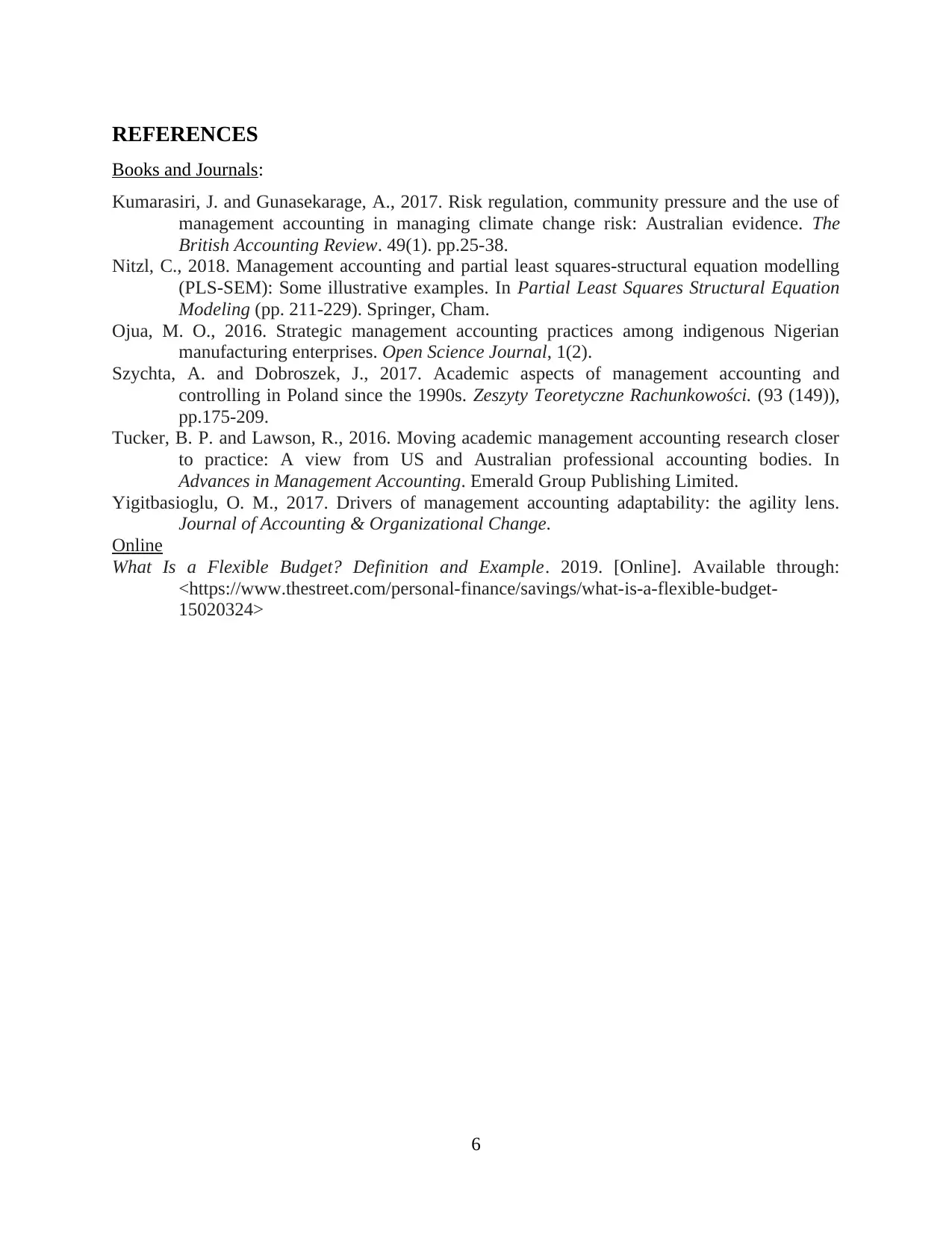
REFERENCES
Books and Journals:
Kumarasiri, J. and Gunasekarage, A., 2017. Risk regulation, community pressure and the use of
management accounting in managing climate change risk: Australian evidence. The
British Accounting Review. 49(1). pp.25-38.
Nitzl, C., 2018. Management accounting and partial least squares-structural equation modelling
(PLS-SEM): Some illustrative examples. In Partial Least Squares Structural Equation
Modeling (pp. 211-229). Springer, Cham.
Ojua, M. O., 2016. Strategic management accounting practices among indigenous Nigerian
manufacturing enterprises. Open Science Journal, 1(2).
Szychta, A. and Dobroszek, J., 2017. Academic aspects of management accounting and
controlling in Poland since the 1990s. Zeszyty Teoretyczne Rachunkowości. (93 (149)),
pp.175-209.
Tucker, B. P. and Lawson, R., 2016. Moving academic management accounting research closer
to practice: A view from US and Australian professional accounting bodies. In
Advances in Management Accounting. Emerald Group Publishing Limited.
Yigitbasioglu, O. M., 2017. Drivers of management accounting adaptability: the agility lens.
Journal of Accounting & Organizational Change.
Online
What Is a Flexible Budget? Definition and Example. 2019. [Online]. Available through:
<https://www.thestreet.com/personal-finance/savings/what-is-a-flexible-budget-
15020324>
6
Books and Journals:
Kumarasiri, J. and Gunasekarage, A., 2017. Risk regulation, community pressure and the use of
management accounting in managing climate change risk: Australian evidence. The
British Accounting Review. 49(1). pp.25-38.
Nitzl, C., 2018. Management accounting and partial least squares-structural equation modelling
(PLS-SEM): Some illustrative examples. In Partial Least Squares Structural Equation
Modeling (pp. 211-229). Springer, Cham.
Ojua, M. O., 2016. Strategic management accounting practices among indigenous Nigerian
manufacturing enterprises. Open Science Journal, 1(2).
Szychta, A. and Dobroszek, J., 2017. Academic aspects of management accounting and
controlling in Poland since the 1990s. Zeszyty Teoretyczne Rachunkowości. (93 (149)),
pp.175-209.
Tucker, B. P. and Lawson, R., 2016. Moving academic management accounting research closer
to practice: A view from US and Australian professional accounting bodies. In
Advances in Management Accounting. Emerald Group Publishing Limited.
Yigitbasioglu, O. M., 2017. Drivers of management accounting adaptability: the agility lens.
Journal of Accounting & Organizational Change.
Online
What Is a Flexible Budget? Definition and Example. 2019. [Online]. Available through:
<https://www.thestreet.com/personal-finance/savings/what-is-a-flexible-budget-
15020324>
6
1 out of 8
Related Documents
Your All-in-One AI-Powered Toolkit for Academic Success.
+13062052269
info@desklib.com
Available 24*7 on WhatsApp / Email
![[object Object]](/_next/static/media/star-bottom.7253800d.svg)
Unlock your academic potential
Copyright © 2020–2026 A2Z Services. All Rights Reserved. Developed and managed by ZUCOL.




